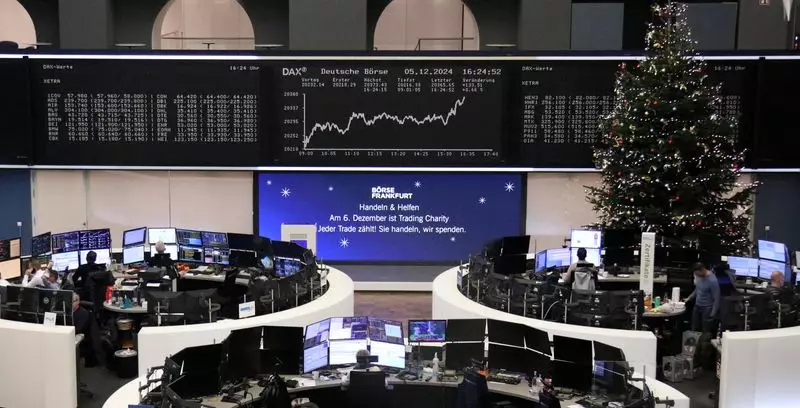European stocks experienced a minor downturn on Thursday as traders began to prepare for an anticipated interest rate cut from the European Central Bank (ECB). The pan-European STOXX 600 index recorded a 0.1% decline after opening on a positive note. As investor sentiment remained cautious, sectors reacted differently, with retail stocks underperforming while automakers showed resilience, indicating a divergence in sectoral performance amidst broader economic concerns.
The current trajectory of the euro zone economy has put significant pressure on the ECB. As economic growth exhibits signs of slowing and political uncertainties rise, investors are closely watching the central bank’s impending decisions. Analysts are forecasting a high probability that the ECB will implement further rate cuts, with current trader sentiment reflecting an 81% likelihood of a 25 basis point reduction, alongside a smaller 19% chance of a more aggressive cut of 50 basis points. This speculation stems from inflation figures trending closer to the ECB’s target, juxtaposed against faltering economic indicators.
Swiss National Bank Takes Decisive Action
Contrasting with the ECB’s cautious stance, the Swiss National Bank made a more assertive move by reducing its interest rate by 50 basis points—the most significant decrease seen in nearly a decade. This policy shift is part of a strategic effort to stay ahead of other central banks and control the appreciation of the Swiss franc amidst increasing global economic pressures. The decision to cut rates could be reflective of an awareness that slower economic growth necessitates more aggressive policy interventions.
The disparity in policy approaches seems to be creating a rift in stock performance between the U.S. and European markets. According to Marija Veitmane, head of equity research at State Street Global Markets, European central banks appear to be lagging in their response to economic challenges compared to their U.S. counterparts, which have been more proactive in lowering rates. This comparative delay has led to U.S. stocks consistently outperforming their European peers, while the dollar strengthens as a result of favorable monetary policies.
In individual stock movements, SThree Plc faced a considerable 26% drop following its warning about profit difficulties for the current financial year, attributed to a tough hiring environment rife with political and macroeconomic uncertainty. Conversely, Diageo Plc saw a 3.8% increase after receiving an upgrade from UBS; analysts noted signs of improvement within the company’s U.S. operations. Additionally, Swiss pharmaceuticals company Lonza enjoyed a 6.1% rise in its stock following the announcement of its strategic exit from the capsules and health ingredients sector.
As European markets grapple with tightening monetary conditions and political landscape uncertainties, investors are urged to remain vigilant. The upcoming ECB rate decision, combined with ongoing earnings reports from major companies, will likely shape market trends in the coming weeks. Navigating this complex environment may require strategic adaptations from investors, focusing on sectors poised for resilience or areas benefiting from shifting economic dynamics. The interplay between political risk and economic policy will remain a critical factor in shaping market trajectories across Europe.

